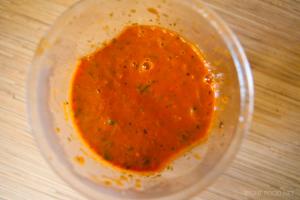Reference book on the Russian language. Spelling of interjections and onomatopoeia Hyphenated spelling of adverbs
The spelling rule defines the hyphenated spelling of interjections as follows: “Complex interjections and onomatopoeic words are written with a hyphen, for example: oh god, oh oh oh oh oh oh oh oh oh oh oh oh oh, ha ha ha ding, kitty-kitty".
Interjections with a particle –ka written with a hyphen: come on. Some compound onomatopoeic words are also written, for example: on the go.
The hyphen is not written in interjection expressions like: Here are those times! Damn you know! I will show you! (te is an abbreviation for you, you).
Note. Interjection Mmm it is recommended to write without a dash if it conveys a feeling of anticipation of something pleasant: Campbell's soup: uh, good!M-M, m-m-m used to denote a sound uttered by someone in a state of indecision, doubt, bewilderment, etc. when speech is interrupted. Often the hyphenated spelling of such interjections is auxiliary in nature (cf.: u-u-u and tuu-tuu-tuu).
Derivative interjections formed from full-valued words retain the same spelling as the original word: God save! Mother! Hello! Farewell! Please! The same applies to interjections derived from words of foreign origin ( Hello! Wow! Bis! Bravo!) and from service parts of speech (for example, particles - you see, you see).
The part of speech that helps to express feelings, motives, emotions is called interjection. It stands apart from other parts of speech.
Exist derivatives(formed from other words) and non-derivative interjections (short forms of words that help express feelings: ooh, ooh, uh, etc.). Several words can be included in one expression of this part of speech at once. (Here it is, pray tell).
With the help of interjections they express feelings, a request, give a command. But there are words that convey the sounds of living and inanimate nature, they are called onomatopoeia. They serve to convey sound and do not convey emotions. (chik-chirp, oink-oink). Such repeated words should be written with a hyphen. They are present in the texts of fiction, fairy tales, poetry. Hyphen spelling of interjections is also due to the repetition of the basics (e hehe, ah-ah-ah, well, well, etc.).
Punctuation marks for interjections
Interjection is a special part of speech that is not included in either independent or official parts of speech, which expresses various feelings, impulses, but does not name them.
For example: oh, ah, hooray, ba, my God, etc.
Features of interjections:
are not grammatically related to other words;
Do not answer questions
do not change;
are not members of the proposal;
Unlike service parts of speech, interjections do not serve to connect words in a sentence, nor to connect parts of a sentence.
In writing, interjections are separated from sentences by a comma or an exclamation mark.
For example: Ugh, God forgive me! Saying the same thing five thousand times...
Oh, everything in the world is made of the same clay ...
- In sentences, these words are separated by commas.
For example: Oh, it hurts me! Ah, where are you?
- When pronouncing interjections with a special feeling, an exclamation mark is used to give emotionality.
For example: Hooray! Holidays are coming soon! Bravo! Well done!
- Words that are pronounced with an imperative-impellent intonation are highlighted with an exclamation mark.
For example: Hey! Come here!
- Established word forms and word-sentences are distinguished by commas, an exclamation mark, and sometimes ellipsis.
For example: Hurray! ... - shouted the soldiers. Thank God you're back!
But there are exceptions! All the rules that exclude punctuation marks were considered in the lesson on punctuation with interjections. Let's recall the main points.
Hyphen in interjections. If interjections and onomatopoeic words are formed by repetition, then they are written with a hyphen. For example: bye-bye; ah-ah; Bow-wow.
Interjections are not distinguished in writing when:
- handling: Oh, you're confused!
- statement: Well, yes, that's how it was.
- negation: Oh no, that won't do.
- The following prepositions are formed by combining prepositions with nouns: due to(meaning "for a reason") like(meaning "similar") instead of, due to, like, about(meaning "o") above.
- Prepositions that are also used as adverbs formed by merging prepositions with nouns, For example: instead, middle and middle, towards(leave to meet guests, cf. leave for a meeting).
But written separately in mind when it does not have the meaning of a preposition, for example: keep in mind; position yourself in front of the enemy.
- Conjunctions formed from the merging of prepositions with pronouns, For example: but, and , besides, in contrast to combinations of prepositions with the corresponding pronouns, for example: my father is old and ill, But: and I stayed with what I had.
- Union to as opposed to combinations of pronouns What with particle would ; union So as opposed to union combination And with pronominal adverb So ; union Also in contrast to the combination of a pronominal adverb So with particle same , For example: I ask you not to speak; But: no matter what you say, I'll still go; so everything is clear; But: and so everything is clear(i.e. "everything is already clear"); he also spoke or he also spoke(i.e. "and he spoke"); But: he said the same(i.e. "he said the same thing").
Unions and particles are also written together if, than, really , even, so that, if only, supposedly, but written separately as if, as if, if, if only (see §87).
Note.Complex unions are written separately, for example: because, because of, So, for nothing that, except that, just now, as soon as, as if, before, as soon as, that is , and phrases used as introductory words, For example: should be, May be, that is, so to speak.
§ 86. Written with a hyphen:
- Compound prepositions because of, from under, over, pose.
- Complex interjections and onomatopoeia, For example: by God, her-same-her, oh-oh-oh, ha ha ha, Oh oh oh, chick chick, ding-ding-ding.
- Words with particles something , koi- , -ka , -or , someday , -That , -tka , -With , -de, For example: something, someone, some, somewhere, anyone, anyone, somebody, come on, somehow, somehow, somehow, well, yes, sir.
The girl came back, announcing that the young lady had supposedly rested badly, but that it was easier for her now and that she would come into the living room right now.(Pushkin).
Note 1. Pronouns someone And something when combined with prepositions, they are written separately (in three words), for example: someone who has, in something. Pronoun some when combined with a preposition, it is written in three words: with some, or in two: with some.
Note 2. Particle still spelled with a hyphen in words after all, anyway and some others, as well as in cases where it follows a verb, for example: Got to know me? In all other cases, the particle still written separately, for example: I do think something(M. Gorky). And yet I don't understand you.



